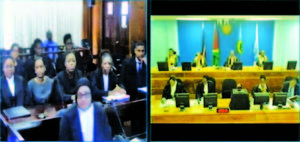Home News CCJ throws out ex-soldier’s application to overturn manslaughter sentence
The Caribbean Court of Justice (CCJ) on Friday threw out an application for special leave filed by former Guyana Defence Force (GDF) soldier Mark Fraser to appeal a decision by the Court of Appeal in Guyana, which had upheld his four-year conviction for manslaughter. 
In a decision read by Justice Peter Jamadar, the Trinidad-based regional court found no potentially serious miscarriage of justice had occurred.
Fraser was convicted for the killing of fellow soldier Oneal Rollins, on October 26, 2006. It was reported that he was heading out on patrol when he stopped to uplift an AK-47 from the army base at Buxton, East Coast Demerara (ECD), and subsequently shot Rollins dead.
On November 14, 2007, Fraser was found guilty of gross negligence manslaughter by a 10-2 majority verdict in the Demerara High Court and sentenced to four years’ imprisonment. After filing an appeal against his conviction on December 14, 2007, and obtaining bail three days later, Fraser never returned to prison. His appeal was then fixed for hearing almost 10 years later, but that hearing was further delayed as the record of appeal was not made available to his Attorneys until October 4, 2017.
While Fraser’s appeal against his conviction was dismissed by the Guyana Court of Appeal, the Court did, however, agreed that the delay in proceedings breached his Article 144 (1) right to a fair hearing within reasonable time and stayed any further imprisonment.
The former GDF member then applied to the CCJ for special leave to appeal the decision of the Court of Appeal in refusing to set aside his conviction.
In dismissing his application for special leave on Friday morning, the CCJ found the approach of the Court of Appeal in hearing the constitutional delay challenge and the substantive appeal together to be wise and prudent. This, according to Justice Jamadar, allows the Court of Appeal to properly consider what might be a just and effective remedy for the breach of the applicant’s Article 144 (1) right.
“The court found that despite the raising of a constitutional issue, this remains a criminal appeal… Having found merit in the constitutional delay point, the Court of Appeal then granted what it considered to be just and effective relief. No prejudice has thus been demonstrated and no serious miscarriage of justice can, therefore, realistically be argued to have occurred,” the CCJ Judge stated.
Referring to Fraser’s claim that his four-year sentence should be set aside because of the delay in the hearing of the appeal, Justice Jamadar pointed to a previous case in which the Court made it abundantly clear that while a conviction may be vacated for violation of the constitutional right to a fair trial within a reasonable time, only in special circumstances or exceptional circumstances will post-conviction delay result in the sitting aside of a conviction properly arrived at.
“This is partly because Courts, in such cases, must balance the principle that persons properly convicted of crime should serve legitimate sentences against a fashionable remedy that is just, effective and proportionate, where a fundamental right has been breached,” he contended.
The CCJ Judge further indicated that it did not find any flaws in the Court of Appeal’s conclusion that the conviction was sound, and that there were no special or exceptional circumstances established to justify cancelling the conviction.
“The jury as primary finders of fact decided that Fraser was guilty of gross negligence manslaughter [and] the trial Judge, after considering a social services report, imposed a four-year custodial sentence. The Court of Appeal agreed with the soundness of these conclusions. This Court is not to lightly interfere.
“Likewise, the Court of Appeal’s decision to not set aside the conviction and to stay further imprisonment was well within the legitimate range of options open to the Court of Appeal, and there was no flaw in their reasoning and no fundamental unfairness, unreasonableness, or injustice in the outcome. In all of these circumstances, no realistic possibility exists that a potentially serious miscarriage of justice can be said to have occurred,” Justice Jamadar asserted.
On this note, the CCJ found that there was no proper basis upon which to grant special leave to Fraser and as such, his application was dismissed.
Also presiding in Court during Friday’s ruling was: CCJ President, Justice Adrian Saunders along with Justices Jacob Wit and Winston Anderson. The unanimous decision was also concurred by Justice Denys Barrow.
Meanwhile, Fraser was represented by Attorney-at-Law Kamal Ramkarran while the Director of Public Prosecutions (DPP) Shalimar Ali-Hack appeared on behalf of the State. They witnessed the ruling via video conference from the Court of Appeal in Kingston, Georgetown.
Fraser was also present in court on Friday. However, his lawyer explained that while the CCJ did not allow leave to challenge his client’s conviction, Fraser will not be serving the four-year sentence since the Court of Appeal had stayed his imprisonment and this was not challenged by the State.
